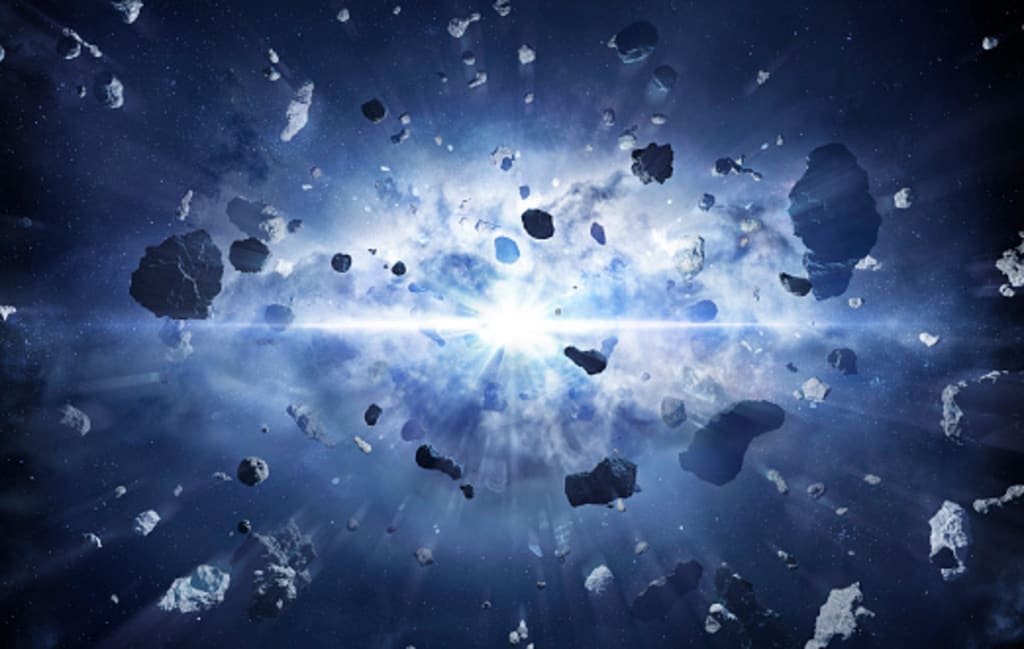The Big Bang Theory
A Journey Through the Origins and Evolution of the Universe

The Big Bang theory is the prevailing cosmological model for the observable universe from the earliest known periods through its subsequent large-scale evolution. In this article, we'll explore the history, science, and implications of the Big Bang theory.
History of the Big Bang Theory
The idea that the universe had a beginning dates back to the early 20th century. At the time, the prevailing view among scientists was that the universe was static and eternal. However, in 1915, Albert Einstein developed his theory of general relativity, which showed that the universe could not be static. Instead, the universe had to be either expanding or contracting.
In 1927, Belgian astronomer Georges Lemaître proposed that the universe was expanding and that it had begun as a single point, which he called the "primeval atom." Lemaitre's theory was largely ignored by the scientific community at the time, but it laid the foundation for what would become the Big Bang theory.
In the 1940s, scientists began to gather evidence that supported the idea of an expanding universe. One of the key pieces of evidence came from astronomer Edwin Hubble, who showed that distant galaxies were moving away from us and that the further away a galaxy was, the faster it was moving. This relationship between distance and velocity is now known as Hubble's Law.
In the 1960s, the discovery of the cosmic microwave background radiation provided further evidence for the Big Bang theory. This radiation is a remnant of the early universe, and its discovery helped solidify the Big Bang theory as the most widely accepted model of the universe's origin.
Science of the Big Bang Theory
The Big Bang theory states that the universe began as a single point, known as a singularity, around 13.8 billion years ago. This point was infinitely hot and dense, and it contained all the matter and energy in the universe. The universe then began to rapidly expand, and it has been expanding ever since.
As the universe expanded, it cooled down, and the matter and energy in it began to separate into distinct particles, such as protons, neutrons, and electrons. These particles eventually formed the first atoms, which then combined to form stars and galaxies.
One of the key predictions of the Big Bang theory is the abundance of light elements, such as hydrogen and helium, in the universe. This prediction has been confirmed by observations of the cosmic microwave background radiation, which shows that the universe is composed of roughly 75% hydrogen and 25% helium, by mass.
The Big Bang theory also predicts the existence of dark matter and dark energy, two mysterious components that cannot be directly observed. Dark matter is thought to make up about 27% of the universe, while dark energy is thought to make up about 68% of the universe. Both of these components are necessary to explain the observed structure and expansion of the universe.
Implications of the Big Bang Theory
The Big Bang theory has profound implications for our understanding of the universe and our place in it. For one, it suggests that the universe had a definite beginning, and that it has been expanding ever since. This has led to questions about what caused the Big Bang, and what existed before it.
The Big Bang theory also suggests that the universe is finite in size, which means that there are limits to what we can observe. This has led to the development of theories such as inflation, which suggest that the universe underwent a brief period of rapid expansion shortly after the Big Bang.
Another implication of the Big Bang theory is the concept of cosmic evolution. According to this idea, the universe has undergone a series of changes and transformations since its inception, leading to the formation of galaxies, stars, and planets. This process has taken billions of years, and it has led to the development of life on Earth.
The Big Bang theory has also led to a deeper understanding of the fundamental nature of the universe. For example, the theory predicts the existence of the cosmic microwave background radiation, which has been detected and studied in great detail. This radiation provides valuable information about the early universe and its structure.
In addition, the Big Bang theory has provided a framework for the study of cosmology, the study of the universe as a whole. Cosmologists use the theory to make predictions about the behaviour of the universe and to test those predictions through observations and experiments.
One of the most exciting aspects of the Big Bang theory is that it is not a static idea, but a dynamic one that continues to evolve with new discoveries and advances in technology. For example, recent observations of the cosmic microwave background radiation have revealed new details about the early universe, such as evidence of inflation and the presence of gravitational waves.
Conclusion
The Big Bang theory is one of the most important and widely accepted scientific theories of our time. It provides a framework for our understanding of the universe and its origins, and it has led to a deeper understanding of the fundamental nature of the universe.
Despite its success, the Big Bang theory is not without its challenges and limitations. For example, it does not explain certain observations, such as the existence of dark matter and dark energy, and it does not provide a complete picture of the universe's history.
Nonetheless, the Big Bang theory remains a critical area of study for cosmologists and astrophysicists. It continues to inspire new research and new discoveries, and it promises to deepen our understanding of the universe and our place in it.






Comments
There are no comments for this story
Be the first to respond and start the conversation.